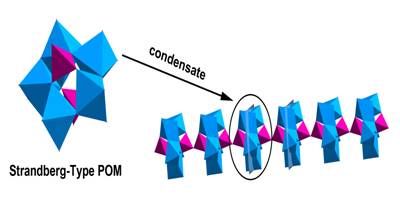A Novel Strandberg-Type POM Synthesized
Editor: | Jan 11,2013
Polyoxometalates (POMs) have been applied in many fields such as catalysis, medicine, biology, magnetism, and material science, because of their wide variety of compositions and structural versatility. The POM based covalently linked frameworks has been focused on. Keggin, Dawson, Anderson, and Strandberg–type POMs have been widely used as the basic building units to construct novel extended structures by means of different linkers such as transition-metal cations, organic groups and metal-organic frameworks.
Prof. PAN Shilie and his Ph.D. students from Xinjiang Technical Institute of Physics & Chemistry, Chinese Academy of Sciences (XTIPC), have synthesized a novel Strandberg-type POM based compound, Cs4Mo5P2O22. Colorless block crystals of Cs4Mo5P2O22were synthesized by spontaneous crystallization from stoichiometric composition melt of Cs2CO3, MoO3, and NH4H2PO4.The structure of Cs4Mo5P2O22 (orthorhombic, C2221) exhibits 1D ∞[Mo5P2O22]4- anion chainswhich are separated by Cs+ cations. The fundamental structure of the ∞[Mo5P2O22]4- chain is diphosphopentamolybdate [Mo5P2O23]6- unit, which could be described as a ring formed by five distorted edge- or corner-shared MoO6 octahedra, capped by two PO4 tetrahedra from either side (Strandberg-type POM unit).
Many POMs contain octahedrally coordinated d0 transition metal cations (V5+, Nb5+, Ta5+, Mo6+or W6+)susceptible to second-order Jahn-Teller (SOJT) distortion, which benefit for second harmonic generation (SHG) in nonlinear optical (NLO) materials. It is expected that POMs with multiple highly distorted octahedra polymerized into clusters tend to exhibit larger polarizations and strong SHG efficiencies.
 |
| A noncentrosymmetric chiral Strandberg-type POM |
The results have been published in Chem. Commun., 2013,49, 306-308.The work was supported by the National Natural Science Foundation of China and “One Hundred Talents” program of Chinese Academy of Sciences.
附件下载:
 (86) 991-3838931
(86) 991-3838931 lhskj@ms.xjb.ac.cn
lhskj@ms.xjb.ac.cn (86)991-3838957
(86)991-3838957 40-1 Beijing Road
Urumqi, XinjiangChina
40-1 Beijing Road
Urumqi, XinjiangChina